Saint of the Day – 20 May – St Bernardine of Siena OFM (1380 at Massa di Carrara, Italy to 1444 at Aquila, Italy of natural causes) “Apostle of the Most Holy Name of Jesus,” Priest, Missionary, Preacher, known as the “Apostle of Italy,” the “Star of Tuscany,” and the “Second Paul.” Saint Bernadine is one of the most renowned Franciscan preachers and reformers, a prolific writer who graced the Church with countless sermons and writings and is largely responsible for increasing the popular devotion to the Holy Name of Jesus. St Bernadine is also remembered for his ardent devotion to Our Blessed Mother and the Holy Family. His numerous Patronages include – against chest and lung problems, respiratory illnesses, of Advertising and Communications and Public Relations workers, against gambling and gambling addictions, of Italy, Diocese of San Bernardino, California, of the Diocese of Capri, Italy, of the Italian Cities of Altavilla Irpina, Aquila, Camaiore, Carpi, Castelspina, Alessandria, Montecchio, Trevignano Romano
Venice.
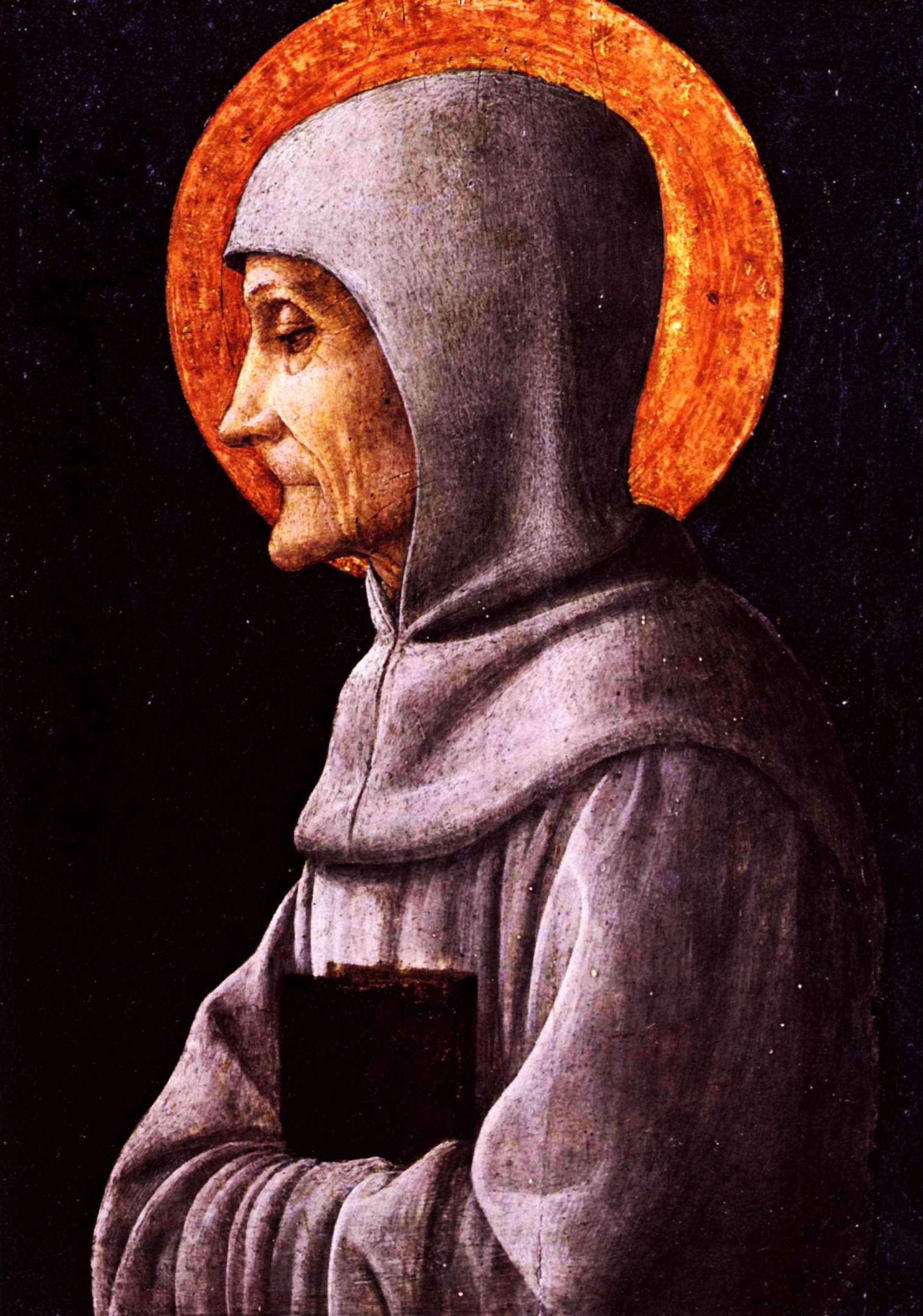
Saint Bernadine was the greatest preacher of his time, journeying across Italy, bringing peace to areas ridden with strife, attacking the paganism he found rampant. When he preached, he would attract large crowds of nearly 30,000 listeners, converting many on the spot. Above all, he followed St. Francis’s admonition to preach about “vice and virtue, punishment and glory.” Saint Antoninus described him as “a new star in the midst of the murky darkness of the earth; to shine with the brightness of Divine gifts; to beam far and wide the bright rays of his glorious life and teachings; to lead in the fear of God, by the holiness of his example, a people whose blindness had removed it from the straight path of the heavenly Homeland.”
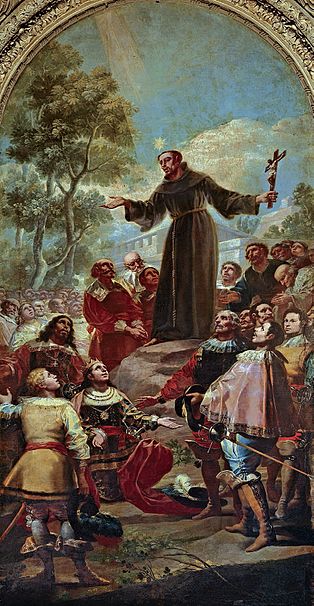
He was born on the Feast of the Nativity of Mary in Siena, Italy. StBernadine entered the world in nobility, the son of a governor. At age six, he lost both his parents and thus orphaned, was raised by a pious aunt who attended to both his physical and spiritual needs. Bernadine excelled at school, demonstrating both intelligence and diligence, holiness and piety, and was well-liked and popular. At age 17, he entered a Marian confraternity at the La Scala hospital, beginning a secluded religious life devoted to prayer and meditation. At that time, the plague raged throughout Europe and Bernadine left seclusion to aid the sick, placing himself at great risk and assuming administration of the hospital. While he never contracted the plague, he fell ill from exhaustion and was confined to bed for several months. While he never fully recovered, his voice—hoarse and weak from his sickness- was fully restored through his devotion to Our blessed Mother, allowing him to develop profound preaching skills. Following his own sickness, his aunt fell ill and he nursed her until her death, never leaving her side. Upon her death, Saint Bernadine turned to fasting and prayer, spending his days seeking the will of the Lord in his life.
One day while he was kneeling at the foot of his crucifix, praying for guidance, Bernadine heard the voice of Jesus say to him: “My son Bernardine, you see Me hanging on the Cross, in a state of total denudation. If you love Me and want to walk in My footsteps, fasten yourself also to the cross, divested of everything.” Following this divine message, Bernadine joined the Franciscan Order, distinguishing himself through obedience, which he considered the virtue of highest import.
Bernadine was assigned to preaching, having a natural gift given by the Holy Spirit. Over the next decade of his life, he traveled throughout Italy, preaching in major cities, a natural successor to Saint Vincent Ferrer. The Adorable Name of Jesus was the usual theme of his sermons, stemming from his aunt’s instruction as a child. Wherever he traveled, he carried a tablet on which the Holy Name of Jesus (IHS) was written, adopting it as his standard and his “sole weapon.” He firmly held only in this Name could man be saved, as Saint Peter had instructed the elders in the Synagogue.
One of Bernadine’s listeners in Siena was to become Pope Pius II. In his notes, the Pope tells of one of Bernardine’s addresses: “One day, as he was preaching in the square in Siena, a thick cloud formed and threatened rain. Everyone wanted to run off. ‘Friends, remain in peace,’ exclaimed the orator. He knelt down and prayed, ordering the cloud, by virtue of the Name of Jesus, to go away. Scarcely had he spoken when the cloud scattered without a drop of rain, and the weather turned as fair as it had been before.”
Bernardine was a preacher of inspired eloquence. He has been called the Doctor of the Heart of Mary due to his writings on Mary’s heart. He wrote, “from her heart, as from a furnace of Divine Love, the Blessed Virgin spoke the words of the most ardent love.” He was also a distinguished master in the science of all things sacred, as is proved by the writings he has left us.
Bernadine’s watchword, like Saint Francis, was peace. He preached peace wherever he went, balancing the social climate of the day with the teachings of the Church. Mass reconciliations were reported as he celebrated Mass, given his encouragement of the kiss of peace between attendees.
Numerous miraculous occurrences were reported in his presence. One day, preaching in praise of the Blessed Virgin, he applied to Her the verse of the Apocalypse: “A great sign appeared in heaven, a Woman clothed with the sun…” At once a brilliant star appeared over his head. On other occasions, Bernadine was understood by all present when he spoke in Italian—even by those who didn’t speak Italian! He obtained miraculous conversions and reformed the greater part of Italy by his burning words and by the power of the Holy Name of Jesus.
Bernardine was appointed Vicar General of his Order in 1438, an office he held for five years. After five years, he began preaching again until, worn out from his missionary labors, he died on the Eve of the Ascension. At his death, his brothers surrounded him, chanting, “Father, I have manifested Thy Name to men.” Saint Bernadine was buried at Aquila in the Abruzzi. The miracles reported at his tomb encouraged Pope Nicholas V to canonise him only six years later.



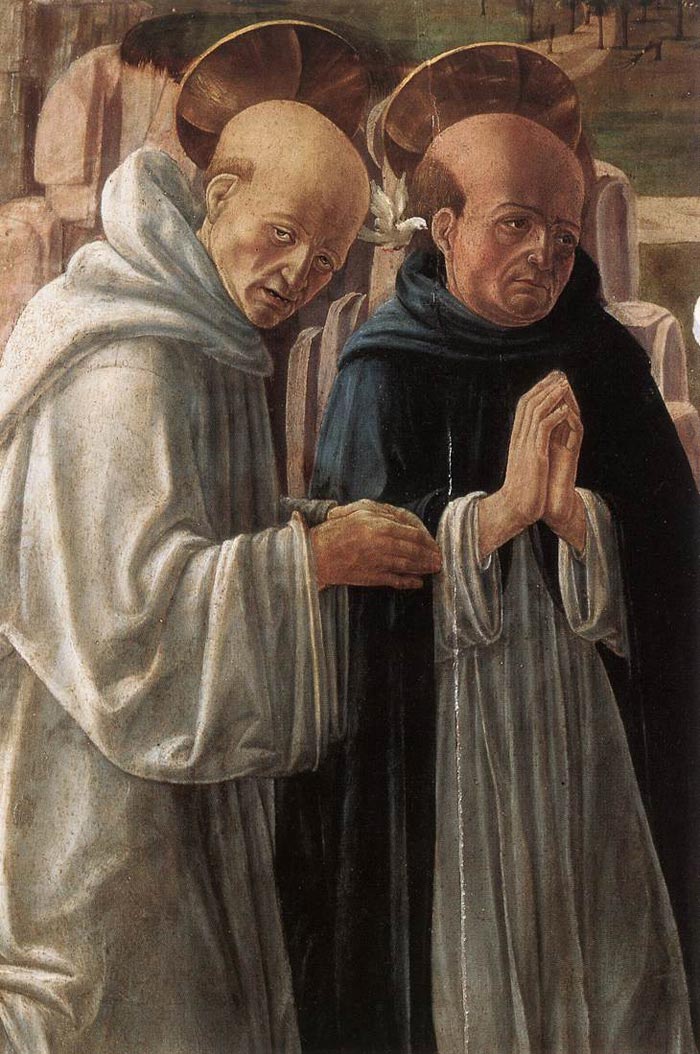
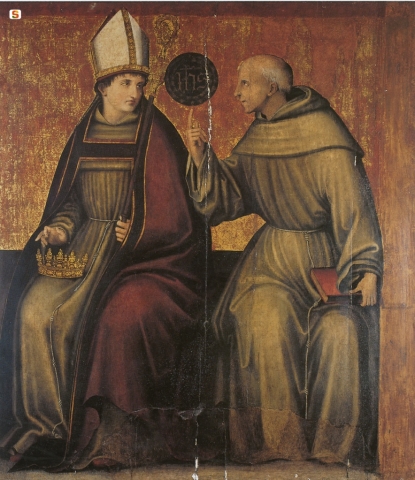

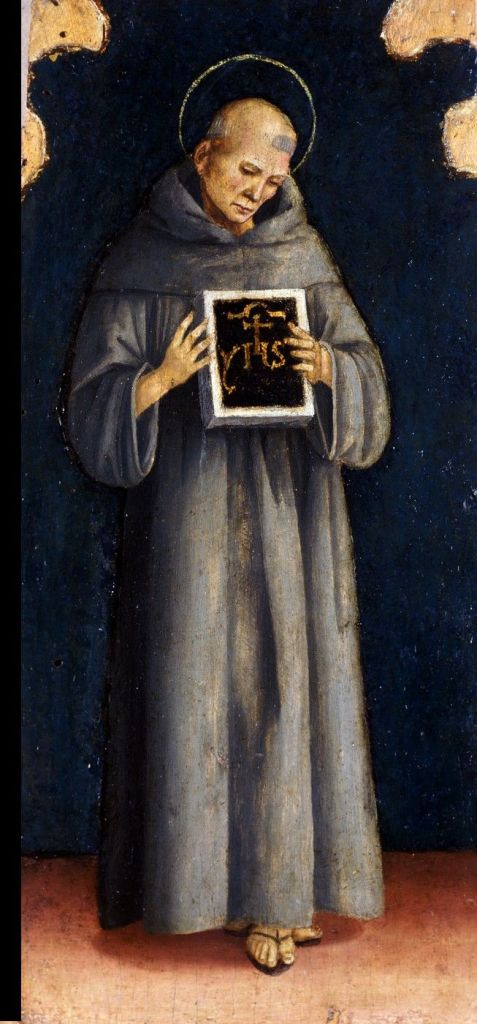
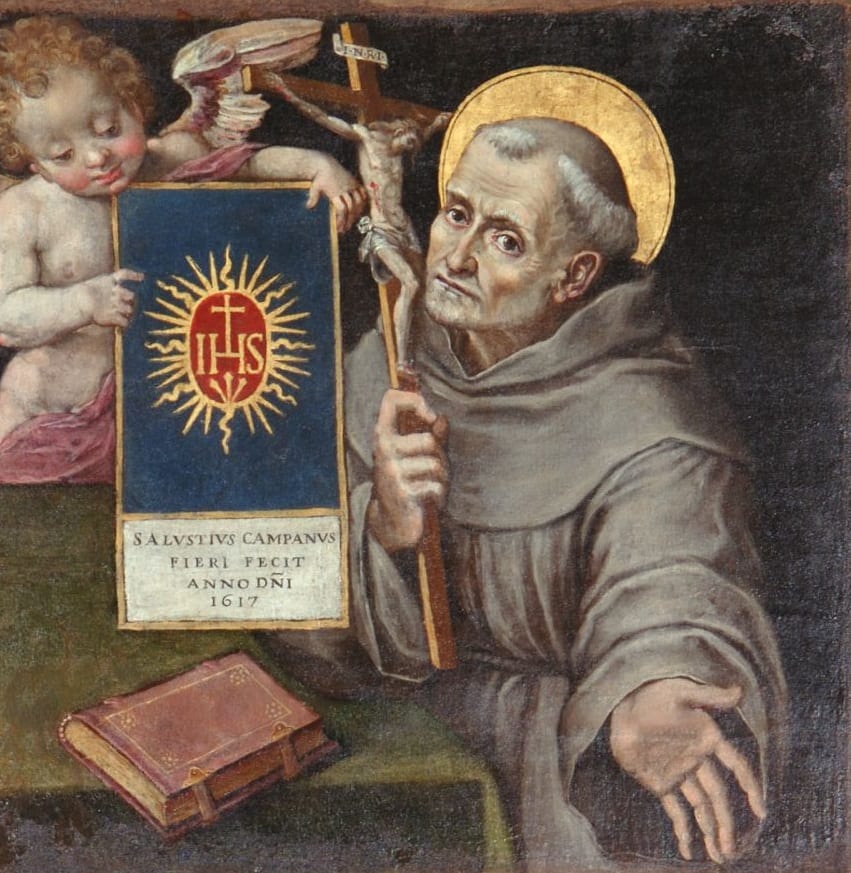

You must be logged in to post a comment.